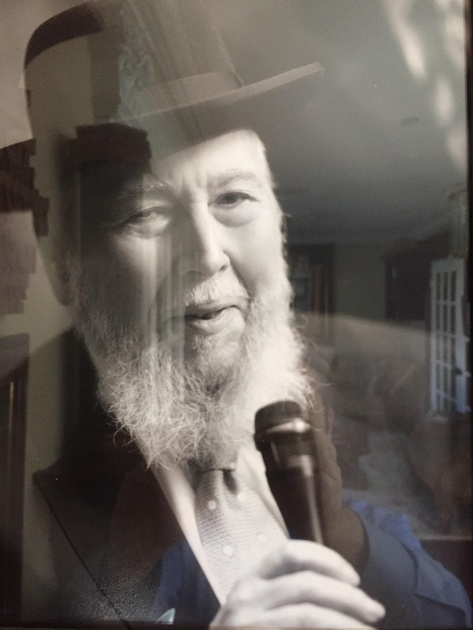
ū©ųĖūæųĖūÉ ūÉųĖū×ųĘū©: ūæų╝ų░ū×ų┤ūÖ ū®ūüųČū×ų╝ųĄū®ūéų┤ūÖūØ ūóųĘū”ų░ū×ūĢų╣ ūÉųĘūøų░ū¢ųĖū©ų┤ūÖ ūóųĘū£ ūæų╝ųĖūĀųĖūÖūĢ ūĢų░ūóųĘū£ ūæų╝ų░ūĀųĄūÖ ūæų╝ųĄūÖū¬ūĢų╣ ūøų╝ų░ūóūĢų╣ū©ųĄūæ. ūøų╝ų┤ūÖ ūöųĖūÉ ūōų╝ų░ū©ųĘūæ ūÉųĘūōų╝ųĖūÉ ūæų╝ųĘū© ū×ųĘū¬ų░ūĀųĖūÉ ūöų▓ūĢųĖūö ū¦ųĖūÉųĖū¢ųĄūÖū£ ū£ų░ūæųĄūÖ ū©ųĘūæ, ūÉų▓ū×ųĘū©ųĖūö ū£ųĄūÖūöų╝ ūōų╝ų░ūæųĄūÖū¬ų░ūöūĢų╝: ūÖųĖūĀūĢų╣ū¦ųĄūÖ ūōų┤ūÖūōųĖūÜų░ ū×ųĘūÉūÖ ūÉųČūóų▒ūæųĄūÖūō ū£ų░ūöūĢų╝? ūÉų▓ū×ųĘū© ū£ųĘūöų╝: ū×ų┤ūÖ ū®ūüų░ū£ų┤ūÖū×ūĢų╝ ū¦ūĢų╝ū©ųĖū×ųĄūÖ ūæų╝ų░ūÉųĘūÆų░ū×ųĖūÉ?
Rava said: In him who makes himself cruel to his sons and other members of his household like a raven for the sake of Torah. This was the case with Rav Adda bar Mattana, who was about to go to the study hall to learn Torah, and his wife said to him: What shall I do for your children? How shall I feed them in your absence? He said to her: Are all the rushes [kurmei] in the marsh already gone? If there is no other bread, let them eat food prepared from rushes.
This is obviously a disturbing Gemara. It cannot be taken literally as Rava HIMSELF says in Berachos 35a:
for Video Shiur click here to listen: Psychology of the DAF Eruvin 22
ūÉų▓ū×ųĘū© ū£ų░ūöūĢų╝ ū©ųĖūæųĖūÉ ū£ų░ū©ųĘūæų╝ųĖūĀųĘū¤: ūæų╝ų░ū×ųĖūśūĢų╝ū¬ųĖūÉ ū×ų┤ūÖūĀų╝ųĘūÖų░ūÖūøūĢų╝, ūæų╝ų░ūÖūĢų╣ū×ųĄūÖ ūĀų┤ūÖūĪųĖū¤ ūĢų╝ūæų░ūÖūĢų╣ū×ųĄūÖ ū¬ų╝ų┤ū®ūüų░ū©ųĄūÖ ū£ųĖūÉ ū¬ų╝ų┤ū¬ų░ūŚų▓ū¢ūĢų╣ ū¦ųĘū×ų╝ųĘūÉūÖ, ūøų╝ų┤ūÖ ūöųĄūÖūøų┤ūÖ ūōų╝ų░ū£ųĖūÉ ū¬ų╝ų┤ūśų╝ųĘū©ų░ūōūĢų╝ ūæų╝ų┤ū×ų░ū¢ūĢų╣ūĀųĘūÖų░ūÖūøūĢų╝ ūøų╝ūĢų╝ū£ų╝ųĖūÉ ū®ūüųĘū¬ų╝ųĖūÉ.
Similarly, Rava said to the Sages who would attend his study hall: I implore you; during the months of Nisan and Tishrei, the crucial agricultural periods, do not appear before me. Engage in your agricultural work then so that you will not be preoccupied with your sustenance all year.
Nesivos Olam, Nesiv Hatorah 3
ū®ūĀūóū®ūö ūÉūøū¢ū©ūÖ ūóū£ ūæūĀūÖūĢ ūĢūöūØ ū¬ūĢū£ūōūĢū¬ ū®ū£ūĢ ūĢūøū£ ūÉū®ū© ūöūĢūÉ ū£ūÉūōūØ ūöūĢūÉ ū×ūæūśū£ ūæū®ūæūÖū£ ūöū¬ūĢū©ūö ūöū®ūøū£ūÖū¬ ū®ūöūÖūÉ ūóū£ ūöūøū£ ūĢūæūÉūōūØ ūøū×ūĢ ū¢ūö ū¬ū×ū”ūÉ ūöū¬ūĢū©ūö. ūĢūÉūÖ ūÉūżū®ū© ū£ūżū©ū® ūÖūĢū¬ū© ūøūÖ ūöūōūæū©ūÖūØ ūóū×ūĢū¦ūÖūØ ū×ūÉūĢūō ū×ūö ū®ū©ū×ū¢ūĢ ūøūÉū¤:
So the Maharal learns “ignoring his children” as a metaphor for his emotional and worldly concerns.
But there is a difficulty, as there is an story being told about Rav Ada bar Masna who seems to have actually ignored the pleas of his wife and children?
And here is where it gets tricky and subtle. Of course the listening audience should not attempt this stunt at home. Meaning, the typical person cannot be devoted to Torah study to such an extent as to ignore the needs of his wife and children, and not even his own health needs. Yet, there is such a human character who is so devoted to his craft, that almost compulsively and with irrational devotion, he or she gives up everything.
This is not only in Torah. There have always been famous artists, scientists and explorers who were so driven, that they would work day and night without any regard for their own welfare or others. When someone reaches that level in Torah devotion, it happens without thought and with little conscious choice. The difference is, that when it comes to Torah study, there is a promise that just as Hashem makes sure the raven’s offspring do not starve, so too Hashem will care for the needs the true devotee and lover of Torah. There is indeed a concept and pattern of human behavior that allows for the rare individual to become so intensely devoted and monomaniacal that all concerns, emotional, personal, physical and relational are mostly ignored. Such a rare person, if his heart is in the right place, and his efforts merit it will receive supernatural intervention.
However, it is important to keep in mind Abaye’s warning (ibid):
ūÉųĖū×ųĘū© ūÉųĘūæų╝ųĖūÖųĄūÖ: ūöųĘū©ų░ūæų╝ųĄūö ūóųĖū®ūéūĢų╝ ūøų╝ų░ū©ųĘūæų╝ų┤ūÖ ūÖų┤ū®ūüų░ū×ųĖūóųĄūÉū£, ūĢų░ūóųĖū£ų░ū¬ųĖūö ūæų╝ų░ūÖųĖūōųĖū¤. ūøų╝ų░ū©ųĘūæų╝ų┤ūÖ ū®ūüų┤ū×ų░ūóūĢų╣ū¤ ūæų╝ųČū¤ ūÖūĢų╣ūŚųĘūÖ, ūĢų░ū£ų╣ūÉ ūóųĖū£ų░ū¬ųĖūö ūæų╝ų░ūÖųĖūōųĖū¤.
Summing up this dispute, Abaye said: Although there is room for both opinions, many have acted in accordance with the opinion of Rabbi Yishmael, and combined working for a living and learning Torah, and although they engaged in activities other than the study of Torah, were successful in their Torah study. Many have acted in accordance with the opinion of Rabbi Shimon ben YoßĖźai and were not successful in their Torah study. They were ultimately forced to abandon their Torah study altogether.
for Video Shiur click here to listen: Psychology of the DAF Eruvin 22
Translations Courtesy of Sefaria
Photo Abba Mari Rav Chaim Feuerman, Ed.D. ZT"L Leiyluy Nishmaso

 Previous
Previous
